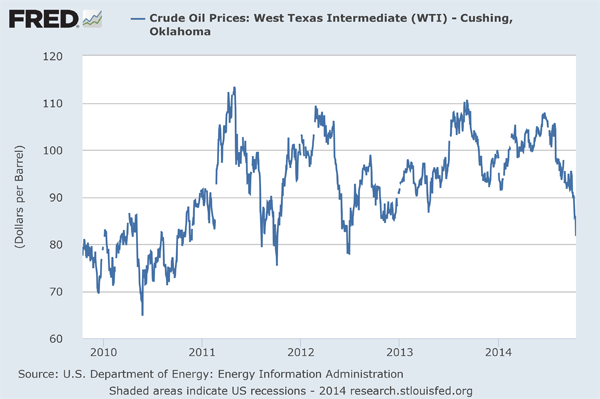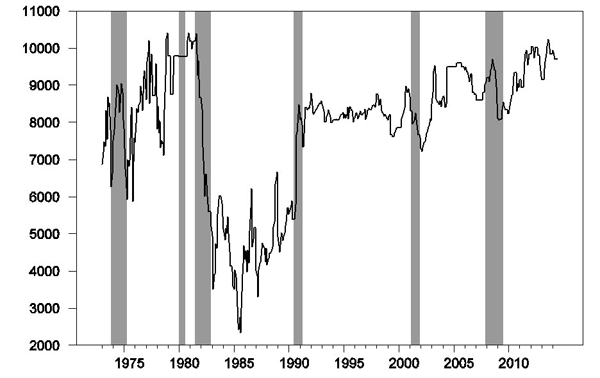

Monthly crude oil production from Saudi Arabia, January 1973 to June 2014, in thousands of barrels per day. Data source: EIA. Shaded regions correspond to U.S. economic recessions.
Posted on 10/21/2014 5:02:59 AM PDT by thackney
Oil prices (along with prices of many other commodities) have fallen dramatically since last summer. Some observers are waiting to see if Saudi Arabia responds with significant cutbacks in production. I say, don’t hold your breath.
When oil demand fell in the 1981-82 recession, the Saudis cut production by 6 million barrels a day in an effort to soften the decline in oil prices. They also cut production in response to lower demand in the 2001 recession and the most recent recession. On the other hand, the kingdom boosted production quickly beginning in August 1990 and January 2003 in anticipation of lost production from Iraq in the two Gulf Wars. This historical behavior led many observers to believe that Saudi Arabia would always play the role of a swing producer to stabilize the price of oil.
But that’s hardly an accurate characterization of what happened during 2005-2007, when Saudi production declined even as prices skyrocketed. If that production decline was intentional, it was a dramatic departure from previous patterns. I think a better interpretation is that the market moves after 2005 became too big for the Saudis to control, and they gave up trying. I remain skeptical of the claim that Saudi Arabia is ever going to produce much in excess of 10 mb/d, regardless of what’s going on in the market.
Last week I discussed the three main factors in the recent fall in oil prices: (1) signs of a return of Libyan production to historical levels, (2) surging production from the U.S., and (3) growing indications of weakness in the world economy.
As far as Libya is concerned, the politics on the ground remain quite unsettled. It makes sense to wait and see if anticipated production gains are really going to hold before anybody makes major adjustments.
In terms of surging U.S. production, the key question is how low the price can get before significant numbers of U.S. producers decide to pull out. If world economic growth indeed slows, and if most of the frackers are willing to keep going strong even if the price falls to $80 a barrel, trying to maintain the price at $90 could be a losing bet for the Saudis. They’d be giving up their own revenue just in order to keep the money flowing into ever-growing operations in Texas and North Dakota.
And if some of the U.S. producers do move into the red at current prices, it’s in the Saudis’ longer-term interests to let that pain take its toll until some of the newcomers decide to pack up and go home. If U.S. production does decline, prices would quickly move back up. But if that happens after a shake-out, the next time there would be less enthusiasm for everybody to jump into the game if they always have to keep an eye on whether they might be undercut again. This may be less of an issue for the U.S. tight oil producers, who can move in or out much more easily than operations like deepwater or artic, where there are huge fixed costs, long lead times, and a much bigger unavoidable loss if you gamble on prices always staying high.
And as for worries of another global economic downturn, so far they are only that– worries. If and when we see a downturn materialize, then I would expect to see the Saudis cut back production.
But until then it’s primarily a question of responding to surging output of U.S. tight oil. My guess is that Saudi Arabia would lower prices rather than cut production as long as that’s the name of the game.
And if it comes down to a game of chicken, I know who’s going to win.


Monthly crude oil production from Saudi Arabia, January 1973 to June 2014, in thousands of barrels per day. Data source: EIA. Shaded regions correspond to U.S. economic recessions.
There is a political aspect to this as well. The Saudis know that lower oil prices will hurt Russia more than they hurt them, and Russia is supporting Iran.
There is another way for some producers who gain by higher prices to respond to lower prices - besides lowering output.
Agitate and stir the pot militarily. I think a Saudi action is typically more adapted to lowering production. But other producers, more nefarious, might lob missiles or attack somewhere to get the world markets worked up a bit.
That would be a flank attack. That would be in addition to the attack on the other flank that are the sanctions.
Perhaps it is a coordinated effort, a coordinated squeeze
I don't think that is true. I believe oil is a higher percentage of Saudi's total income than it is of Russia. Russia sells far more Natural Gas than Saudi.
where did you get that notion?
good point, hurts Iran more
You can’t just look at the amount of oil revenue, you have to consider the cost of extraction. The Saudis can pump oil at a cost of $10 a barrel. At $75, they’re still making $65 on each barrel.
Things are far different in Russia, where they have to drill deep wells in horrifying climates. The corruption and payoffs required add to the costs.
Maybe some, but not all of what they produce today. They have been spending dollars for years now going after more costly oil, Enhanced secondary and tertiary recovery of fields with deeply dropped production rates. They are not meeting their current production averaging $10 in cost.
Offshore in shallow waters, they built 27 man-made drilling islands, 13 platforms, and 15 onshore drillsites. The project includes 41 km of causeways and 3 km of bridges designed to maintain natural water flow in Manifa Bay. They have worked for over half a century trying to figure out a way to economically produce this lower value, high sulfur heavy oil with high metal content.
For the curious, I included a bunch of links for info on this project.
https://www.saudiaramcoworld.com/issue/196006/manifa-oil.field.under.the.sea.htm
http://www.theoildrum.com/node/9056
http://www.oilandgasnewsonline.com/Article/33782/No_plans_to_raise_output_capacity
file:///C:/Users/Todd%20Hackney/Downloads/Jan-De-Nul_Manifa-Field-Causeway.pdf
Yep, Iran is their target, Russia getting hurt is a pleasant by product of their actions. If and when the US allows Iran to get the bomb watch for the Saudi’s to quickly procure one or more from the Paks or the Norks to offset the lunatics in Tehran.
Targets are Iran and the US crackers.
Disclaimer: Opinions posted on Free Republic are those of the individual posters and do not necessarily represent the opinion of Free Republic or its management. All materials posted herein are protected by copyright law and the exemption for fair use of copyrighted works.